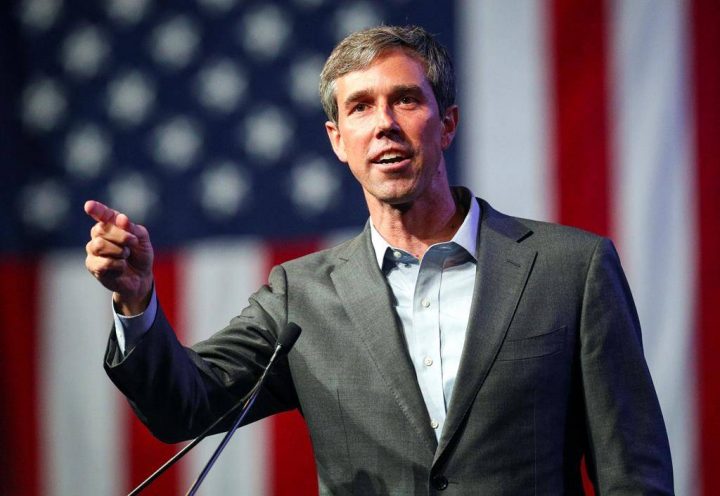Beto O’Rourke’s response to a question during a Houston town hall meeting this past summer lasted only four minutes. But for some Democrats it said everything. It was authentic.

In an exchange that quickly went viral, the Democrat congressman and Senate hopeful was asked whether he found NFL players who knelt during the national anthem to be disrespectful. A passionate O’Rourke told the room of Texans, not necessarily a sympathetic crowd, that he could “think of nothing more American than to peacefully stand up, or take a knee, for your rights.”
Clips of his answer were viewed millions of times online, generating buzz in O’Rourke’s uphill battle against Republican Sen. Ted Cruz.
WATCH: U.S. Senate candidate for Texas Beto O’Rourke defends NFL players’ right to protest

For national Democrats, it was the type of moment that epitomized a common buzzword in Democratic circles — “authenticity” — and the push to present candidates in a more open, unvarnished manner offering a window to their values.
One of the widely accepted lessons from Democrat Hillary Clinton’s loss in 2016 to Republican Donald Trump was that voters gravitate toward candidates they perceive as real, even if flawed. They’re drawn to politicians willing to deliver unexpected candor.
WATCH: Democrats are the ‘party of crime’: Trump blasts rivals

“I don’t think politicians give voters enough credit for the fact that people want to know who you are, what you stand for and what your values are,” said Karen Finney, a Democratic strategist. “Even if they disagree with you, if they think you’re coming from a principled position, they can respect that.”

Get daily National news
In an effort to deliver that authenticity this election season, the party has tried to assemble a group of candidates with nontraditional backgrounds. They’ve recruited veterans, women and politicians with diverse histories. They’ve encouraged them to talk openly about their lives in ads and to make casual, unscripted social media posts.
There’s no hiding that some of this effort borrows from the man Democrats are hungry to beat.
Trump’s fans often say they admired his candor and willingness to defy political conventions. Another model is Bernie Sanders’ campaign against Clinton for the nomination, which was marked by the Vermont senator’s unwillingness to play the part of a slick, poll-driven candidate as he railed against income inequality. Clinton was often described as too careful, rehearsed and robotic.
The push also coincides as the #MeToo movement has demanded greater accountability, and social media allows a candidate such as O’Rourke to draw thousands of Twitter views of his speeches from behind the wheel of his pickup truck.
WATCH: Joe Biden says he believes many Democrats could defeat Trump, predicts good chance at winning Senate

His campaign announced a record $38.1 million raised during the past three months.
Democrats who may consider a White House run in 2020 are watching closely. They’ve become more accessible in the months before the formal start of that campaign.
Massachusetts Sen. Elizabeth Warren has released a decade worth of tax returns, held frequent town hall meetings and started engaging with journalists for Senate hallway interviews after shunning them in the past.
In one notable move, Warren cooperated with an exhaustive Boston Globe investigation during the summer. The paper found that the senator’s career as a law professor was not helped by her assertions that she has a Native American heritage.
Other senators who are potential 2020 contenders, including Kamala Harris of California, Cory Booker of New Jersey and Amy Klobuchar of Minnesota, displayed a visceral reaction to the Supreme Court nomination of Brett Kavanaugh and tried to delay the proceedings during the then-judge’s first appearance before the Senate Judiciary Committee. Harris later staged a walk out before a key vote as senators considered allegations of sexual assault made against Kavanaugh.
“We are at a point in this country where there is greater distrust of politics and political institutions than at any point in modern history,” said Jesse Ferguson, a Democratic strategist and veteran of presidential and congressional campaigns. “If you can’t show what you’re doing and why you’re doing it, nobody will believe you will actually do it.”
In less contentious settings, potential candidates such as Colorado Gov. John Hickenlooper are pointing to their unusual backgrounds to vouch for their everyman appeal. Hickenlooper notes that he was laid off from his job as a geologist during the 1980s, a period that led him to open a Denver brew pub. He later became the city’s mayor.
WATCH: Trump accuses Democrats of playing ‘con game’ against Brett Kavanaugh

“I was out of work for almost two years and you see a different person in the mirror,” Hickenlooper said at a recent Brookings Institution event alongside Gov. John Kasich, R-Ohio, as he pointed to the need for skills development.
The emphasis on authenticity has been a hallmark of a number of Democratic candidates this year who are pledging to challenge status-quo politics.
Kentucky congressional candidate Amy McGrath, for example, has drawn nearly 1.9 million views on YouTube for an ad that describes her path to becoming a combat pilot in the Marines and her pledge to protect health care.
The South Dakota’s race for governor features Billie Sutton, a state senator and former rodeo star who was paralyzed from the waist down more than a decade ago after he was thrown from his horse at a North Dakota rodeo. Sutton, an underdog against Rep. Kristi Noem, a Republican backed by Trump, says the injuries were a turning point in his decision to enter public service.







Comments
Want to discuss? Please read our Commenting Policy first.